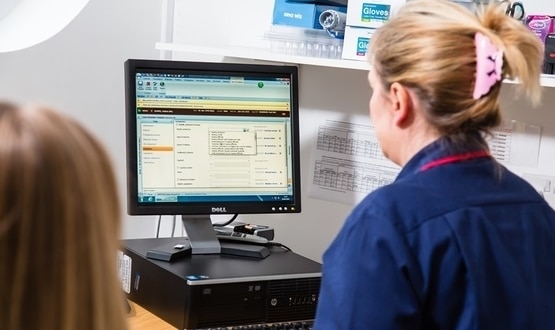GP IT Futures: first stage of procurement process now complete
- 14 August 2019

NHS Digital has completed the first phase of the GP IT Futures procurement process, with the invitation to tender now closed.
Seventy-three suppliers have submitted tender applications to be on the new £484 million general practice IT framework, which aims to bring better IT systems into primary care.
It replaces the GP Systems of Choice (GPSoC) agreement that has been in place since 2007, with a view to improving data-sharing between care settings.
An NHS Digital spokesperson told Digital Health News it was “very pleased with the number of applications”, which will now be subjected to an assessment and assurance procedure.
Martin Warden, director for the digital transformation in general practice programme at NHS Digital, said: “We are delighted that so many suppliers have submitted their applications to tender to be on the new GP IT Futures framework. It is great to have so many companies who share in our vision to provide GPs with the best possible tools and services, at the highest possible standards.”
GP IT Futures marks a departure from the concept of having principal and subsidiary GP IT systems, and a framework previously dominated by TPP, EMIS, InPS Vision and Microtest.
Announced in August 2018, the new framework emphases the use of open standards while levelling the playing field for new entrants in the IT supplier market.
In doing so, it is hoped patients will be able to take better control of their care through improved access to digital GP services, such as video consultations and access to their records.
Dr Masood Nazir, SRO for GPIT Futures and associate CCIO of primary care digital transformation at NHSX, said: “The GP IT Futures framework has been designed to ensure that GP colleagues and practices will be able to choose from modern, assured and well-designed products that reflect what is needed for general practice for now and for the future.
“These solutions will help to reduce burden in delivering patient care.”
GP IT Futures marks Lot 1 of a new procurement process for Digital Care Services put out to tender by NHS Digital – on behalf of Matthew Hancock – in May 2019.
Lot 1 of the contract is valued at £484m, while Lot 2 is valued at £16m.
The contract for both lots is scheduled to end on 31 December 2020, with an option to extend it until 31 March 2023.
Suppliers awarded for Lot 1 of the tender will automatically be awarded for Lot 2 unless they opt-out.
NHS England and NHSX recently published a list of accredited EPR suppliers for secondary care under its Health Systems Support Framework.





5 Comments
Answer to Mary. I don’t understand what half the acronyms in your response are but you must remember that Matt Hancock is a technology lover and tends to stick his oar in wherever that word appears. Many clinicians argue about technology, not because they fully understand it, but that they have seen results before that suggest that technology is not the silver bullet. They are usually told to go away and play with their scalpels, as they were in the debacle to end them all – NPfIT.
Apologies.
PCNs – Primary Care Networks
STPs – Sustainability & Transformation Programs
CCGs – Clinical Commissioning Groups
GPs – General Practices (or General Practitioners)
Both PCNs & STPs are in a state of development – there doesn’t seem to be any agreement on what they are – & more importantly what if any powers they have to set budgets – & be accountable to – someone?
There will be more acronyms along presently –
For a decade the GP market for information technology in England has been dominated by a few suppliers – the new contract aims to change this position.
At Vision, we welcome the move by NHS England to replace the GPSoC buying framework with GP IT Futures. By opening up the competition to more providers and ensuring more systems are available there is now an opportunity for Clinical Commissioning Groups, Primary Care Networks and Integrated Care Systems to create modern digital services for patients and professionals.
We believe that primary care providers in England deserve a rich ecosystem of suppliers that will support them in saving time, doing more with the available resource, making it easy to share information between different care settings, and having data available when and where they need it to provide the best patient care.
We are therefore pleased to announce our submission to tender as part of this first stage of procurement.
RFA – Requirements For Acreditation – was introduced in the early 1990s to ensure that all GP IT systems could fulfill the – mainly administrative & Fundholding – functions specified by the then powers that be – or were.
The side effect of this was that the many GP IT systems available prior to RFA shrank to basically 4 – those with sufficient users to support the very high costs of developing that year’s requirements – and the rest – including start-ups – went out of business.
Remember, GPs could claim 50% of costs for IT (the money came from the budget for staff and premises – nothing new) – but only for acredited systems. The results were predictable…
I haven’t seen the details of the bids for inclusion in the GP IT Futures Lots – but will the existing – & any new entrants – suppliers of GP systems have to be able to support basic functions as well as interoperability with other systems, many of which have yet to be developed or installed in other organisations? If not, would any practice or CCG want to procure them?
I’m getting confused.
“GP IT Futures marks Lot 1 of a new procurement process for Digital Care Services put out to tender by NHS Digital – on behalf of Matthew Hancock – in May 2019.”
I thought the whole point of the Health & Social Care Act 2012 was to *remove* day to day management – & *all* responsibility – for the NHS & its problems from the Secretary of State for Health: what is the involvement of Matt Hancock in deciding or procuring IT for GPs?
“Lot 1 of the contract is valued at £484m, while Lot 2 is valued at £16m.
The contract for both lots is scheduled to end on 31 December 2020, with an option to extend it until 31 March 2023.”
However, this seems a bit short: the tendering process has only just finished and “An NHS Digital spokesperson told Digital Health News it was “very pleased with the number of applications”, which will now be subjected to an assessment and assurance procedure.” – which will presumably take some time before final approval.
Even if approval follows by the end of August (2 weeks after tenders closed), the contracts would end after either 15months or, if extended (would this be on a case by case basis or en mass?) 2 years & 6 months.
Given the time needed by local health economies – & the numerous other redisorganisational demands on PCNs, STPs, CCGs & GPs, how likely is it that “updating” GP IT systems – with or without the involvement of the surviving GP practices – will be the priority that NHS Digital (or NHSX or Matt Hancock) expects or demands?
*And* what happens to the GP systems already in place – & essential for running practices & caring for patients – in the meantime?
Comments are closed.